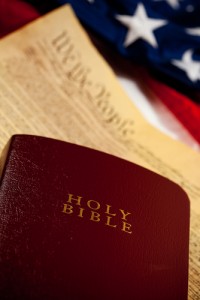What part does the citizen Christian play in his/her government?
 As to government and our responsibility to participate, we must be as robust in our contribution to it as we are allowed to be as citizens. “We the People” (the first three words in the constitution) includes Christians as well as it does secularists.
As to government and our responsibility to participate, we must be as robust in our contribution to it as we are allowed to be as citizens. “We the People” (the first three words in the constitution) includes Christians as well as it does secularists.
The issue may be finding the balance between the passionate Christian political activist, who is never in want for a political cause to champion or protest, and the fatalist pre-determinist, who claims Christians have no power or right to influence the government. One extreme might have us wage constant battle with the culture, while the other would see complete withdrawal as not only the solution, but possibly even God’s will.
If we reject the Moral Majority model, does that suggest we should live in a fatalistic, do-nothing state? Absolutely not! It is vital for American Christians today to be reminded that in addition to voting and participating as a political candidate, there are fundamental, contractual rights they possess that even the apostle Paul could identify with to a limited degree. Christians, along with the rest of the citizenry, still have certain guarantees (rights) as prescribed in the Constitution.
Societies that operate under the rule of law allow their citizens to be protected by those laws. Paul may have had no say in his government (no voting rights or free speech to criticize it), but he did have some contractual rights as a citizen of Rome. Remember, Paul was born in a region (Tarsus) where he attained natural citizenship. This allowed him a kind of appellate process in the Empire not afforded to non-citizens.
In chapter 22 of the book of Acts, we see Paul being removed from a near-riotous scene with Jewish antagonists. He is accused of high crimes and taken into custody by soldiers from the Jerusalem Roman garrison. As he was about to be summarily flogged, possibly even to death (a brutal Roman interrogation method using a flagellum with the body stretched out to magnify the torture–prisoners often died), he exercised his contractual right as a Roman citizen.
Paul told the Roman Tribune that he was a citizen of Rome. Beating and unrestricted confinement were no longer an option for the Roman commander, since citizens could appeal the charges brought against them. Paul, by exercising his citizenship “rights,” was given a reprieve of sorts, and though we don’t know the precise timeline, God in His sovereignty allowed him to live seven to ten more years.
During this time, he would receive an all-expense-paid trip to Rome to make his appeal, possibly to the Roman Emperor himself. While under house arrest, he wrote epistles to the Ephesians, Philippians, Colossians and the letter to Philemon. After his acquittal, he probably traveled to Asia Minor and wrote 1Timothy and Titus before finally being arrested and thrown in a dungeon by the suddenly vengeful Caesar Nero. His last months before martyrdom were spent writing 2 Timothy.
Paul, by demanding his civil rights, likely gave himself opportunity to minister directly to the Church body for many years beyond what he would have, had he not taken action. Paul’s willingness to use his Roman citizenship to avoid what some scholars believe was certain death teaches us that when the laws of the state are just, we may appeal to them for protection.
Paul, in this instance, gives Christians living in 21st century America some critical instructions for managing their lives under any form of government. First, we must be acutely knowledgeable of the laws of the land (Federal, state and local) and how we can use those laws to assist us in sustaining our ministry on earth.
Paul was forced to go to much greater lengths to protect his life, which he did in order to carry on his ministry, than any American has experienced in the past 225 years. I think he would heartily approve of American Christians making vigorous use of the Constitution, particularly the First Amendment, to protect the rights they already enjoy.
Secondly, I believe we can infer by Paul’s awareness of Roman law, and his willingness to act on it, that if American Christians are to participate intelligently as voters, we are required to know the issues as well as the candidates and their positions on those issues. To be unprepared is nothing less than poor stewardship of the system of government we are blessed to live under. Paul couldn’t participate in his government, but if he could, I believe he would have called it good stewardship to be engaged, and poor stewardship not to.
During the forum for Public Policy for the Southern Baptist Convention this summer, Russell Moore urged evangelicals to study the issues and the candidates in all elections—Federal and local. He also believes the assault on religious liberty is the primary threat confronting America. With respect to whom Christians should vote to represent them he advised, “What you want is somebody who will act justly and someone who will carry out competently what he has been given to do or what she has been given to do without overrunning conscience and disrupting the common good.”
Finally, the manner in which believers make their presentation in the public square is critical. Paul gives nothing but gracious responses to even the most outrageous and unfair reprisals from his antagonists. As we engage the culture we can use Paul’s example as a template for the way in which we speak or write.
Though we have rights under the Constitution, and we should always be knowledgeable about the laws of the land so we can defend against those who would seek to muzzle our speech and our thoughts, we must remember our responsibilities first. Only a few short years after he was given his reprieve by the Roman Tribune in Jerusalem, and during his first confinement in Rome, Paul, under the inspiration of the Holy Spirit, made this statement: “Only conduct yourselves in a manner worthy of the gospel of Christ, so that whether I come and see you or remain absent, I will hear of you that you are standing firm in one spirit, with one mind striving together for the faith of the gospel” (Philippians 1:27).
Paul was reminding the Philippians (and us) that he expected them to above all else, be preoccupied with presenting the Gospel as a united, faithful body. It is possible that we are entering a time of unprecedented persecution. That outcome should not change our perspective on Philippians 1:27. In fact, our resolve should be stronger than ever.
We all might want to listen to Western Theological Seminary professor Carl Trueman when he says, “The incidentals of my life, rather like the incidentals of my culture, are just that—incidentals—and no real significance compared to the substance and practice of the faith.” He goes on, “Regardless of SCOTUS or the 2016 election, as I live I will still be baptizing the children of congregants, administering the Lord’s Supper, preaching week by week, performing marriages, rejoicing with those who rejoice, burying the dead and grieving with those who grieve.”


One Comment
Leave a reply →